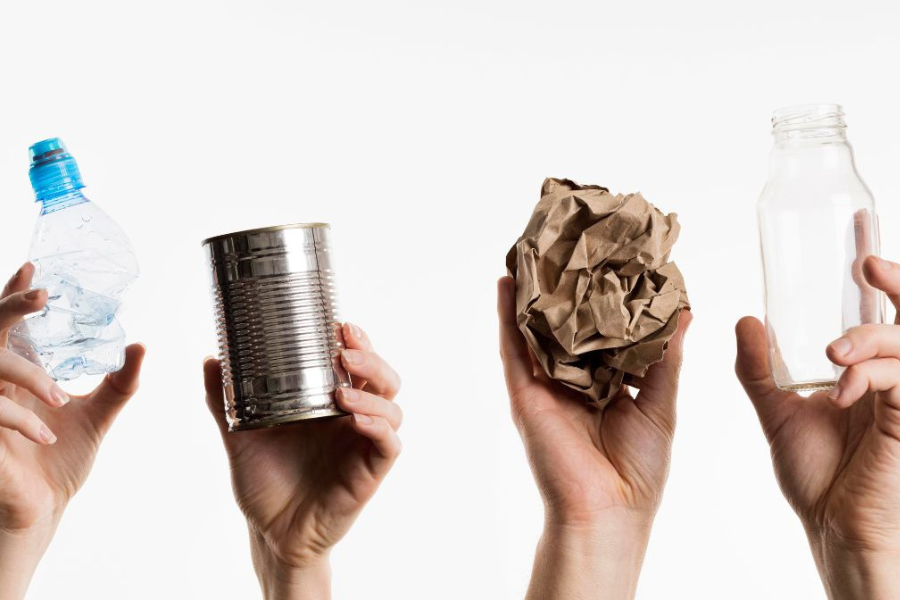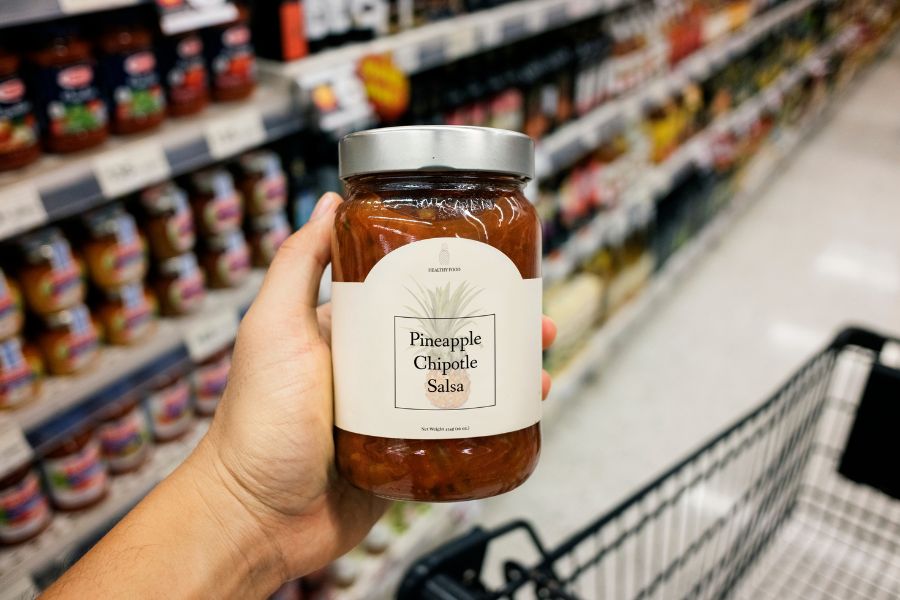5 Eco-Friendly Food Packaging Materials

The food industry is undergoing a significant shift towards sustainability, with eco-friendly food packaging playing a crucial role in reducing environmental impact. In the U.S., trends show that consumers are increasingly prioritizing sustainability in their purchasing decisions.
In fact, 43% of consumers consider environmental impact a key factor when choosing products. As regulatory bodies introduce stricter guidelines and businesses aim to align with sustainability goals, the demand for green packaging solutions continues to rise.
Benefits of Eco-Friendly Packaging
- Generate Fewer Carbon Emissions: Sustainable materials often require less energy to produce, reducing overall carbon footprints.
- Send Less Packaging to Landfills: Biodegradable and recyclable materials help divert waste from landfills.
- Packaging Versatility: Many eco-friendly materials can be molded into various shapes and sizes to meet different food packaging needs.
- Ease of Disposability, Recycling, or Reusing: Sustainable packaging options can be easier to recycle or reuse, with the aim of reducing waste.
- Increased Customer Base and Improved Brand Image: Many consumers prefer brands that prioritize sustainability, leading to stronger customer loyalty.
Eco-Friendly Packaging Materials for Food Products

Sustainable food packaging is more important than ever as consumers and businesses seek to reduce their environmental impact. Eco-friendly packaging materials not only help minimize waste but also support a circular economy by using compostable, recyclable, and renewable resources.
From durable and reusable options to biodegradable solutions, there are a variety of materials that can meet both sustainability goals and food safety standards. Below, we’ll explore some eco-friendly packaging materials, each offering unique benefits for food products.
1. Glass
Glass is a highly sustainable material known for its recyclability, durability, and ability to preserve food freshness. It is free from harmful chemicals and can be endlessly recycled without losing quality.
| Container Type | Description | Use Cases |
| Glass boston round bottles | Rounded shape with narrow neck, ideal for liquids or thicker products. | Best for syrups, oils, and specialty beverages, like cold brew and kombucha. |
| Glass sauce dressing bottles | Narrow neck, designed for easy pouring of dressings, sauces, and condiments. | Perfect for salad dressings, marinades, sauce and condiment packaging. |
| Glass mayo economy jars | Wide mouth and tapered shape, perfect for thick, spreadable products like mayo or jams. | Ideal for mayo packaging, honey, and thick sauces like mustard. |
| Glass straight sided jars | Uniform cylindrical shape, ideal for both dry and wet foods with excellent visibility and freshness. | Suitable for pickles, nut butters, and jams. |
| Glass universal jars | Simple, versatile design with straight sides, suitable for various food products. | Great for jams, jellies, syrups, and honey packaging. |
2. Recycled Plastic
Recycled plastic, including Post-Consumer Recycled (PCR) plastic, offers a sustainable alternative to virgin plastic. It reduces the demand for new plastic production and aligns with sustainability initiatives.

When using recycled plastic, safety is a concern. Plastic can absorb contaminants, and chemicals may degrade over time, risking contamination of food and beverages. The FDA mitigates these risks by issuing guidelines and conducting spot tests to ensure compliance. For more details, you can explore the safety of recycled plastic in food packaging.
Types of Eco-Friendly Plastic Packaging:
- HDPE (High-Density Polyethylene): Strong, lightweight, and widely recyclable.
- LDPE (Low-Density Polyethylene): Flexible, moisture-resistant, and commonly used for food wraps.
- PET (Polyethylene Terephthalate): Transparent, durable, and highly recyclable.
| Container Type | Description | Use Cases |
| Plastic boston round bottles (HDPE, LDPE, or PET plastic) | Lightweight, round shape with a narrow neck for easy pouring and sealing. | Sauces, oils, dressings, juices. |
| Plastic dairy square bottles (HDPE plastic) | Square shape for stability, designed for dairy products and refrigeration. | Milk, cream, yogurt. |
| Plastic jug bottles (HDPE plastic) | Large with a handle, ideal for bulk liquids and easy pouring. | Juices, iced tea, lemonade. |
| Plastic regular wall jars (PP or PS plastic) | Lightweight, cost-effective jars with durable walls for everyday use. | Candy, cookies, jams, jellies, small-batch sauces. |
| Plastic wide mouth jars (HDPE or PET plastic) | Wide opening for easy filling and secure sealing. | Nut butters, honey, jams, sauces. |
| Plastic square pinch grip jars (PET plastic) | Compact, square jars with pinch-grip sides for easy handling and pouring. | Salt, sugar, seasoning blends, peanut butter. |
| Plastic straight sided canisters (HDPE plastic) | Straight-sided canisters have airtight seals and are designed for dry goods, offering bulk storage and freshness. | Coffee, tea, powdered drink mixes, dry ingredients, cereal. |
3. Paper & Cardboard
Paper and cardboard packaging are biodegradable, recyclable, and sourced from renewable materials. They are widely used in food packaging due to their lightweight and cost-effectiveness.
| Container Type | Description | Use Cases |
| Cardboard boxes | Sturdy, corrugated boxes ideal for shipping, storage, or bulk packaging. | Transporting, storing, or shipping bulk products. |
| Cardboard cartons | Folding or chipboard cartons used for retail-ready packaging. | Packaging products that will be displayed on shelves such as beverage cartons, and snack and cereal boxes. |
4. Aluminium
Aluminum is a lightweight, infinitely recyclable material that provides excellent protection against moisture, light, and air, making it ideal for food and beverage packaging.
| Container Type | Description | Use Cases |
| Aluminum cans | Open head cans with liner for food safety | Soup cans, beans, and canned fruits and vegetables. |
| Aluminum containers | Straight sided containers with lids | Specialty food packaging such as cookies, candies, and teas. |
| Aluminum bottles | Various styles of lined bottles | Beverage packaging, edible oils, and supplements |
5. Flexible Packaging
Flexible packaging can be made from multiple materials, including recycled plastic and biodegradable paper. Many flexible materials are considered eco-friendly due to their lightweight nature and recyclability.
| Container Type | Description | Use Cases |
| Paper pouches | Bags with or without a plastic lining for visibility, can also be gusseted or flat. | Nuts, cookies, coffee, tea, and specialty snacks. |
| Recycled plastic pouches | Plastic bags made of PCR, with or without gusset | Coffee, bulk herbs and spices, and tea |
How to Choose the Right Eco-Friendly Material for Food Packaging

In today’s eco-conscious world, businesses are focused on reducing their ecological footprint while addressing consumer demand for sustainability. Selecting the right eco-friendly packaging solutions impacts the environment, food quality, costs, and brand perception.
The following outlines key criteria for choosing sustainable materials, helping you make informed and responsible decisions that preserve food freshness and align with sustainability goals.
- Material-food compatibility: Ensure that the packaging material preserves freshness and does not react with the food.
- Cost and budget: Evaluate the long-term cost-effectiveness of the material to determine if it fits within your budget.
- Regulatory compliance: Verify that the packaging meets industry standards and food safety guidelines.
- Consumer appeal: Consider the sustainability preferences of your target audience when making your choice.
- Durability and protection: Assess the material’s ability to protect the product during storage and transportation.
- End-of-life disposal: Opt for materials that are recyclable, compostable, or reusable to minimize environmental impact.
Eco-Friendly Food Packaging to Avoid
With the growing emphasis on sustainability, it’s important to recognize the environmental impact of food packaging. Many commonly used materials contribute significantly to pollution and waste, making it critical to choose alternatives that are more eco-friendly.
In this section, we will explore some of the most problematic packaging options. Understanding these issues can help us make informed decisions that benefit both our health and the planet.
- Single-Use Plastics: Single-use plastics, while versatile, harm the environment due to their non-biodegradable nature, taking hundreds of years to decompose and contributing to pollution. Many compostable alternatives are available, and several regions have implemented bans on single-use packaging.
- Polystyrene Foam: Polystyrene foam, or expanded polystyrene foam (EPS), is a plastic material used for insulation, packaging, and food containers. It poses environmental risks as it takes centuries to decompose and is difficult to recycle, often ending up in landfills and waterways.
- Non-recyclable Packaging: Many packaging materials, like UV-coated or glossy items, are non-recyclable. Aerosol cans can also damage recycling machinery, making them unsuitable. Plastic shopping bags and plastic wrap usually aren’t accepted because the material can tangle, clog, and potentially damage the machinery in recycling centers. However, many grocery store chains allow consumers to reuse plastic shopping bags; some even have collection bins for torn or unusable bags to send to facilities that can process this type of plastic.
While many materials can’t be recycled for various reasons, there are a lot of options available when it comes to alternatives to plastic packaging.
Innovations in Eco-friendly Food Packaging

- Edible Packaging Solutions: Edible packaging is an eco-friendly alternative to traditional packaging made from materials like seaweed and milk protein. For example, during a marathon in London, where edible drink pods replaced disposable cups, minimizing waste. These pods, encased in seaweed-based film, can be swallowed or will biodegrade in 4-6 weeks if discarded. This innovation aims to reduce plastic use in food packaging and offers a faster decomposition option than single-use plastics and compostable bioplastics.
- Plant-based or Bio-based Plastics: Plant-based plastics and bio-plastics are made from renewable materials such as corn, starch, seaweed, and bamboo fiber. Although “bio-plastics” lacks a precise definition, it generally refers to materials that are partially derived from renewable sources and may be biodegradable. It’s essential to consult suppliers for proper disposal practices, as these can vary based on the materials and additives used.
- Self-decomposing Solutions: Self-decomposing solutions are made from materials like mushroom mycelium. This type of packaging is a biodegradable material that decomposes within a few weeks. Mushroom-based packaging offers a regenerative alternative to plastic foams used in protective packaging. This type of sustainable packaging even encourages plant growth, making it an excellent alternative to plastic-based packaging.
Move Towards a Greener Future Today
Choosing eco-friendly packaging is not just an environmental responsibility but also a strategic business move. By opting for sustainable materials, companies can reduce their carbon footprint, enhance brand reputation, and meet consumer demand for environmentally friendly food packaging solutions.
Explore our range of packaging options, including custom packaging, labeling services, and sustainable solutions tailored to your food product needs.
Interested in learning how our packaging can elevate your brand? Reach out to us today to discuss your unique requirements, and let us help you find the perfect packaging solution that resonates with both your values and your customers!
For more info, check out our Sustainable Packaging Guide.
Hayley is a marketing professional and copywriter with a background in crafting content for a diverse range of industries. She has been writing about packaging and supply chain logistics for Paramount Global since 2022. She specializes in explaining complex topics in a clear and engaging way and is an advocate for sustainability in packaging and supply chain management.
Read More
For over forty years, Paramount has been delivering perfectly integrated packaging and supply chain solutions.
